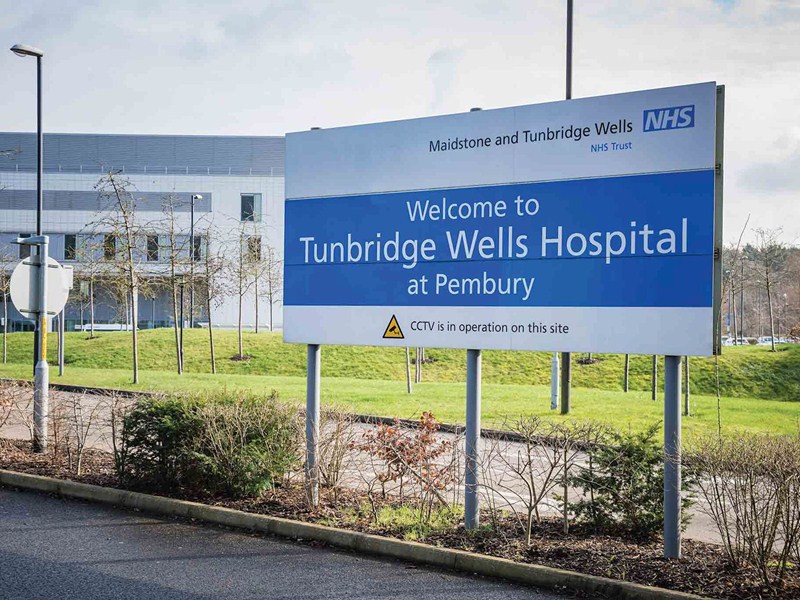A team of specialists is to be parachuted into Tunbridge Wells Hospital in the coming weeks in an attempt to stop it losing so much money. They will work with senior management to come up with a viable plan to reduce overspending.
The move comes after the hospital was put into financial special measures in a last-ditch attempt to stop the board of Maidstone and Tunbridge Wells NHS Trust from overshooting its budget. It’s likely to lose almost £24million this year.
Auditors Grant Thornton reported the trust to the Secretary of State because it had breached its duty to break even in the three years ending March 31, 2016.
There could now be worrying consequences for patients with the news that part of the latest initiative means a relaxing of waiting time targets.
Alongside four other trusts – Barts Health in London, Croydon Health Services, Norfolk and Norwich Hospitals and North Bristol – Maidstone and Tunbridge Wells will no longer be fined for missing the 62-day target for cancer treatment, the four-hour A&E target or the 18-week goal for routine operations.
Due to the poor state of their finances, these trusts will instead be incentivised to improve on their current performance with extra funds from the money being invested into the NHS this year.
Patients Association Chief Executive Katherine Murphy said: “We do not support this move. This is the slippery slope back to the bad old days of never-ending waiting times and uncertainty – with patients left endlessly on A&E trolleys and waiting for life-changing operations. Where is it all going to end?”
The organisation has already had patients call into their helpline ‘in desperation’ seeking advice and guidance she said, adding:
“Our own research has highlighted that for elective surgery, such as cataract operations, the mean average waiting time in days has increased from 64 days in 2010 to 93 days in 2015.
“This is a significant jump and we are very concerned that relaxing the rules on waiting time targets will only exacerbate an already unacceptable situation for patients. And, more worryingly, does this mean patients can expect to see services cut altogether?”
In addition to the relaxation of waiting times, the external team, headed by an ‘improvement director’, will oversee reforms at the trust and help draw up the recovery plan.
The improvement director will be supported by NHS Improvement, with additional oversight provided by NHS England and the Care Quality Commission.
A spokeswoman for the Maidstone and Tunbridge Wells NHS trust said special measures were part of a drive to address problems throughout the health service.
“The NHS is tackling a £2.4billion funding deficit this year amid unprecedented demand for its services. These challenges are faced by the majority of trusts.
“We are addressing these shared challenges at a local level. Patients can be assured that we are doing our absolute best to drive down waiting times, are delivering quality improvements, keeping our patients safe, and welcome the opportunity to work with NHS Improvement to be even more cost-effective.”
What’s next?
A spokesman for NHS Improvement (NHSI) said despite the relaxation of A&E, cancer treatment and operation targets, patients should not see any decline in care ‘in the short term’ and some improvement can be expected over the long run.
A team of NHSI experts with ‘working knowledge’ of the local area are set to be appointed in the coming days, headed by an improvement director.
This role will be given to someone with experience in running hospitals and trusts and with a track record for delivering results, who will also act as the ‘eyes and ears’ of NHSI.
Over the coming weeks, a ‘rapid recovery’ plan will be drawn up between the improvement director’s team and the members of the Maidstone and Tunbridge Wells NHS Trust board.
This plan, which will be tailored to the specific needs of the trust, will then be implemented over the following months and the spokesman said the NHSI expect to see some improvement ‘within that timeframe’.
To exit special measures the trust must generally have, as a minimum, a robust recovery plan setting out the key changes required to remedy the provider’s financial problems, approved by its board and by NHSI.
In addition to providing evidence of significant wins within two additional months of agreeing the initial recovery plan, NHS Improvement may require evidence of demonstrable progress in implementing more fundamental change.
The spokesman added: “The relaxation of targets is not about letting go of the reins. It is about being more realistic about what can be achieved and therefore relieving some of the pressure.”
- ‘Financial special measures only relate to issues of finance and therefore should not be confused with ‘special measures’, which relate to a failure in care.
What is PFI?
A private finance initiative (PFI) is a method of funding infrastructure projects such as schools and hospitals without the government incurring the upfront costs.
Once the desired building is completed, a lease of around 30 years is signed by the developer and the institution which occupies it obliges the school or hospital to begin reimbursing the developer through annual payments.
These payments incur interest, and often include management fees, which will inevitably deliver a profit for the developer in excess of the original price it took to provide the infrastructure.
The Tunbridge Wells Hospital was built by John Laing Group for £237million in 2012 on a 30-year contract with current PFI costs for the hospital running at £24million per year – approximately six per cent of the total budget.








